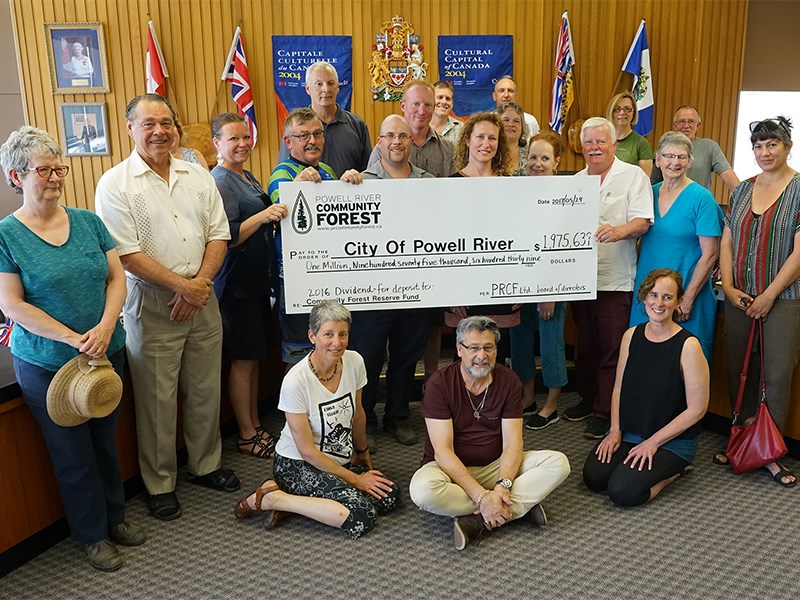Powell River Community Forest president Greg Hemphill presented City of Powell River council with a dividend of just under $2 million on Monday, May 29, for the city’s reserve fund.
2016 was a banner year for Powell River Community Forest, a city-owned logging company with a timber licence to harvest trees east of the city.
“The record profits resulted from an increase in our allowable cut, a very strong market for our timber and some sound strategic decisions,” Hemphill told council and the gallery full of funding recipients from the community.
The company operates with a volunteer board appointed by city council. All its profits are returned to the city in the form of an annual dividend.
“We’re pleased with the projects we’ve accepted,” said Hemphill. “We think it’s a good mix of sizes and themes.”
Including the 2016 dividend, community forest has injected a little more than $8.5 million into the city over the past 11 years.
Hemphill announced that the board was recommending $1.61 million as part of 16 grants for community projects this year.
Most notable was a $600,000 grant to Powell River Public Library board to go toward the $1.4 million it was tasked to raise with the city’s purchase of the library’s new building on Alberni Street.
According to Hemphill, it is the third largest grant the board has ever handed out; first goes to the creation of the Timberlane Park track and second was the $1.1 million purchase of Millennium Park trees in 2015.
Hemphill told council that despite the fact the community forest board had a record year and it was allocating $1.61 million in community funding, more than $3 million in requests came in for the board to assess, such as $200,000 to build out space at Townsite Market for a technology hub. That request did not make it this time around, but will be reconsidered in future granting selections, said Hemphill.
The community forest board has its own selection and evaluation criteria for projects it wishes to support. Hemphill presented the board’s list at council’s finance committee on Thursday, May 25.
Qualifying for a grant is a competitive process, not first-come, first-served, said Hemphill after the finance committee meeting.
“There are some proponents who are putting more effort into the projects than others,” he said, “as opposed to someone who is just making a straight ask for a grant.”
He added that the forest board performs its due diligence vetting each request, shortlisting and performing followups with those they plan to support.
“We do a process ourselves with due diligence with all the proponents,” said Hemphill. “If we’re going to stand in front of council, we need to know a fair amount about what we’re planning to recommend as far as grants go. It’s a pretty thorough process. Obviously, we collaborate with the city and if the city knows something we don’t then we’re quite willing to listen to what they have to say as well.”
The process of council approving this year’s forest board selections did not go without debate.
Though councillors voted in favour of supporting a $100,000 grant for Texada Heritage Society to replace the roof on its museum next to Texada Elementary School in Van Anda, it came with apprehension.
A majority of councillors struggled with supporting the grant to a society that only weeks before told city directors on Powell River Regional District’s board it was rejecting the idea of participating in a regional heritage service and would not even attend committee meetings to discuss possible options.
Councillor CaroleAnn Leishman said that she initially struggled to support the Texada grant, but decided to do so in the end.
“I just hope the Texada museum reconsiders that they don’t want to be a part of the community,” said Leishman. “By sharing this funding with them I hope they understand we’re acknowledging they are a part of our community, and I would like to continue to invite them into discussions about working together and collaborating as one big community.”
Councillor Russell Brewer added that there is no harm in talking about different options for cooperating.
“It doesn’t preclude them from opting out at any time,” said Brewer. “At least sitting at the table with the rest of us would be welcome.”
Brewer said he does not understand how Texada Heritage can take $100,000 from the city, but on the other hand say it does not want to participate in the regional community.
Several grant recipients stood at the meeting to express gratitude for the financial support, including Texada Heritage’s treasurer Peter Stiles.



